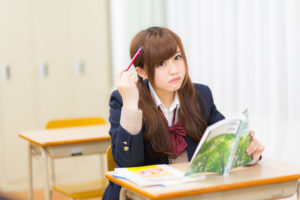令和3年度公立高校入試はこんなんだった 3
公立高校入試問題の解説その3
少人数指導「スミ塾」
大阪市東住吉区駒川3ー1ー9
TEL080ー7828ー9328
令和3年度一般選抜
続いても公立高校一般選抜の英語C問題からです。
大問3
According to an old book,on June 10th in 671,a clock was used for the first time in Japan.
古い書物によると、671年6月10日、時計が日本では初めて使用された。
It was a clock which used water.
それは水を使った時計だった。
The date is very important for the history of clocks in Japan.
その日は、日本の時計の歴史にとって、とても重要です。
In the 17th century ,in Japan,people began to make some mechanical clocks,but they did not become very popular because people could know the rough time by watching the sun or hearing the sounds of bells from temples.
17世紀、日本では、人々がいくつかの機械式時計を作り始めた。しかしそれらはあまり普及しなかった。なぜなら、人々は太陽を見たりお寺の鐘の音を聞くことによって、おおよその時間を知ることができたからだ。
However,in the Meiji period,some people began to use mechanical clocks,because they needed them to use modern technologies which were introduced to Japan from Western countries.
しかしながら、明治時代になって、人々のなかには機械式時計を使いはじめる人もいた。なぜなら、彼らは、西洋の国々から日本に紹介された近代的な技術を使うため機械式時計が必要だった。
For example, in 1872, the first train in Japan began to run.
例えば、1872年、日本初の列車が走り始めた。
If people tried to take a train,they needed to know the exact time.
もし人々が列車に呪うとしたら、彼らは正確な時間を知る必要があった。
The change in society ① some changes in people’s awareness about time,but very slowly.
社会の変化が、時間について人々の意識にいくつかの変化~~~、しかしとてもゆっくりと。
Many people did not feel the importance of knowing the exact time so much.
多くの人々は、正確な時間を知ることの重要性をそんなに感じなかった。
In 1920, some people at that time thought it was necessary to change people’s awareness about time to make Japan a modern country.
1920年当時の人々のなかには、日本を近代国家にするためには時間について人々の意識を変える必要があると思っている人もいた。
With such a purpose, in that year, an exhibition about time was held in Tokyo.
そのような目的のなかで、その年、時間についての展覧会が東京で開催された。
Through many interesting things which were shown, people could learn how time had influences on their lives.
展示された多くの興味深いものを通じて、人々は時間が自分の人生にどのように影響を与えるのか学ぶことができた。
The exhibition became very popular,and about 220,000 people came.
展覧会はとても人気が出て、約22万人の人々が来場した。
During the exhibition ,June 10th became the “Day for celebrating time” because on that day over 1,200 years ② that year,the first clock was used in Japan.
展覧会の開催中に、6月10日は時の記念日となった。なぜなら、その年~~~1200年以上のその日、初めての時計が日本で使われたからだ。
At noon, on that day in 1920, all over Tokyo,people could hear a sound which told it was 12 o’clock.
1920年のその日の正午、東京中の人々が12時ちょうどを知らせる音を聞くことができた。
The exhibition gave many people a change to have a sense of minutes and seconds.
展覧会は、多くの人々に分や秒の感覚を持つための変化を与えた。
And, people began to improve clocks to make them more accurate.
また、人々は時計をもっと正確にするため、それらを改良し始めた。
Just in one century after the first Day for celebrating time, clocks have become very accurate and people have become very punctual.
最初の時の記念日からちょうど1世紀後、時計はとても正確になり、人々はとても時間に正確になっている。
We don’t know how our awareness of time will be changed in the future by more accurate clocks or changes in society.
もっと正確な時計や社会の変化によって、将来、我々の時間に対する意識が、どう変化するのかわからない。
(1)
The word which should be put in ① is
ア brought イ ended ウ solved エ took
①のある文を日本語訳すると、「社会の変化が、時間についての人々の意識に、いくつかの変化~~~、しかしとてもゆっくりと」となる。
~~~の部分には、「もたらした」のような言葉が入ると想定されるので、アのbroughtが良い。broughtはもちろんbringの過去形だ。
ここでも、無生物の主語がくる文章をどれだけ読み込んだかがカギになる。
(2)
The word which should be put in ② is
ア after イ agou ウ before エ since
②のある文を日本語訳すると、「展覧会の開催中に、6月10日は時の記念日となった。なぜなら、その年~~~1200年以上のその日、初めての時計が日本で使われたからだ」となる。~~~の部分には、その年のその日から1200年以上前のその日という意味になるようにすれば良いので、答えはウのbeforeが正解。エのsinceにしたいところだが、現在完了形でもないので間違い。
(3)
The exhibition about time was an event which tried to
ア have some influences on people’s awareness about time.
イ tell how difficult it was to make Japan a modern country.
ウ show how people’s lives had influences on improving clocks.
エ change Japan by making Japanese mechanical clocks more accurate.
時の展覧会は、~~しようとしたイベントだった、という内容の~~になにを入れたら良いのか。アは時についての人々の意識に影響をもたらせようとしたとなるので、正解と分かる。
(4)
According to the passage,
ア before the Meiji period, there was no technology for making mechanical clocks in Japan.so people at that time could not know the exact time.
「明治時代以前、日本には機械式の時計を作る技術がなかった」とあるので不適。
イ in the Meiji period, a train was not introduced to Japan from Western countries because people were not ready to use clocks.
「明治時代、列車は西洋の国々から日本に紹介されなかった」とあるので不適。
ウ on June 10th in 1920, people in Tokyo had a chance to hear a sound which told it was noon.
「1920年6月10日、東京の人々は正午を告げる音を聞く機会があった」とあるので適している。
エ although one hundred years have passed since the first Day for celebrating time, people have not become punctual.
「最初の時の記念日から100年経過したけれども、人々は時間に正確になっていない」とあるので不適。

